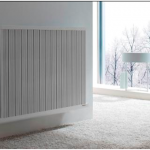Having damaged or broken glass not only looks awful but will vastly decrease the warmth, insulation and security of a building. Broken glass is not very good as insulating, also drawing the attention of potential vandals and burglars. How does glass get damaged to the point where the windows need replacing or repairing?
To help understand why a double-glazed window might crack, it’s helpful to know how one is made. There are two panes of glass placed either side of a vacuum or a layer of inert gas. This makes a barrier to either repel or contain heat to maintain your property at a stable temperature. As a sealed unit, the pressure is constant inside the gap with the air pressure on the outside of the glass. The period when most breaks occur is during the winter where the extremely low temperatures of outside are on one side of the glass while the warmth of our central heating is on the other. It is this temperature difference that can cause issues.
1) Weather
Windows in particular are a more delicate defence against the outside elements. The glass withstands hail, rain, wind, snow, excess heat and UV rays. Over time, the seasonal changes with rising and falling temperatures will affect the integrity of the glass in the windows. Humidity is a particular problem for deterioration of window sashes. In the UK we see a lot of rain and high moisture which can lead to eventual cracking of glass and window components. For a Gloucester Double Glazing Company, visit https://www.firmfix.co.uk/
2) Physical Impacts
We need glass in our homes and workplaces to let in the natural light and a refreshing breeze. Glass nowadays is incredibly strong and durable, withstanding reasonable impact but it will still break or crack if it is hit by a solid object with force. Most glass damage is caused by people, whether it’s a cricket ball or intentional vandalism. In some instances, large birds have flown into glass and shattered it.
3) Window Age
As with anything, the passing of time and wear and tear will lead to a deterioration in the condition of a window. Even the most cared for glass in a mild climate will not last forever. It’s not just the glass but the window’s components that age. Even glass that’s never been the victim of impact or harsh weather can develop cracks over time due to the natural contraction and expansion of structures.
The better the strength of the glass, the less likely it is to experience a crack. A thick sheet is more resistant to stress than a thin sheet for obvious reasons. When choosing new windows, bear this in mind and opt for a thicker pane of glass. Square or round windows have the lowest risk of suffering a crack or break due to its greater flexibility. A shorter pane of glass has less space to flex than a larger piece of glass. The window shape least likely to suffer breaks would be a tall, narrow window.




Average Rating